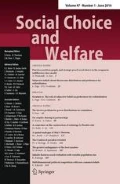Abstract.
A social welfare function is Arrovian if it is transitive-valued and satisfies IIA. We examine the logical relation between the statements (A) If f is Arrovian with domain 𝒫 then it is dictatorial if it satisfies the Pareto criterion and (W) If f is Arrovian with domain 𝒫 then it is dictatorial or inversely dictatorial if it is non-null and satisfies non-imposition. We exhibit a class of domains on which W implies A and another on which A implies W. We also present examples of domains on which one of the statements is true and the other is false.
Similar content being viewed by others
Author information
Authors and Affiliations
Additional information
Received: 23 October 2001/Accepted: 19 March 2002
We thank our two referees for their suggestions for improving the exposition.
Rights and permissions
About this article
Cite this article
Campbell, D., Kelly, J. On the Arrow and Wilson impossibility theorems. Soc Choice Welfare 20, 273–281 (2003). https://doi.org/10.1007/s003550200181
Issue Date:
DOI: https://doi.org/10.1007/s003550200181



